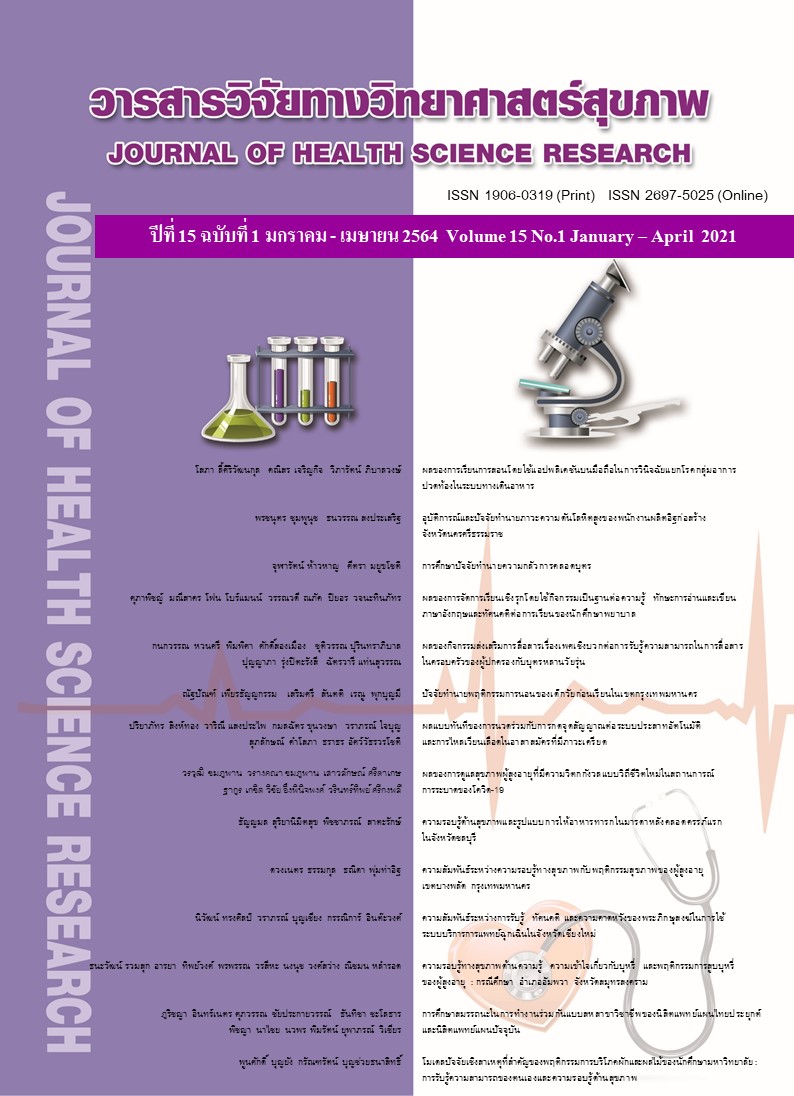โมเดลปัจจัยเชิงสาเหตุที่สำคัญของพฤติกรรมการบริโภคผักและผลไม้ของนักศึกษามหาวิทยาลัย : การรับรู้ความสามารถของตนเองและความรอบรู้ด้านสุขภาพ
Main Article Content
บทคัดย่อ
ปัญหาพฤติกรรมการบริโภคอาหารของนักศึกษามหาวิทยาลัยควรได้รับการแก้ไขอย่างจริงจัง เพราะเป็นสาเหตุของภาวะโภชนาการเกินและโรคอ้วนในอนาคตได้ ประกอบกับพฤติกรรมการบริโภคอาหารในช่วงวัยของนักศึกษาเป็นตัวกำหนดพฤติกรรมการบริโภคอาหาร ซึ่งจะส่งผลต่อภาวะสุขภาพในอนาคต ดังนั้น จึงมีความจำเป็นที่จะส่งเสริมให้นักศึกษาปรับเปลี่ยนพฤติกรรมการบริโภคผักและผลไม้ให้เหมาะสม เพื่อแก้ไขปัญหาภาวะโภชนาการเกิน โดยส่งเสริมให้นักศึกษาปรับเปลี่ยนพฤติกรรมการบริโภคผักและผลไม้ที่เหมาะสม การแก้ไขจะเน้นปัจจัยที่เป็นสาเหตุของปัญหา บทความนี้ นำเสนอโมเดลปัจจัยเชิงสาเหตุของพฤติกรรมการบริโภคผักและผลไม้ของนักศึกษามหาวิทยาลัย โดยสังเคราะห์โมเดลที่เกี่ยวข้องกับโมเดลปัจจัยเชิงสาเหตุของพฤติกรรมการบริโภคผักและผลไม้ และจำกัดขอบเขตของปัจจัยเชิงสาเหตุไว้เฉพาะปัจจัยส่วนบุคคล เพราะเป็นปัจจัยที่ทำให้เกิดการปรับเปลี่ยนพฤติกรรมการบริโภคผักและผลไม้ได้อย่างยั่งยืน
จากการสังเคราะห์โมเดลปัจจัยเชิงสาเหตุ พบว่า ปัจจัยความรอบรู้ด้านสุขภาพและปัจจัยการรับรู้ความสามารถของตนเองในการปรับเปลี่ยนพฤติกรรมการบริโภคผักและผลไม้ มีอิทธิพลทางตรงต่อพฤติกรรมการบริโภคผักและผลไม้ และปัจจัยความรอบรู้ด้านสุขภาพมีอิทธิพลทางอ้อมต่อพฤติกรรมการบริโภคผักและผลไม้ผ่านทางปัจจัยการรับรู้ความสามารถของตนเอง หรืออีกนัยหนึ่ง ปัจจัยการรับรู้ความสามารถของตนเองเป็นตัวแปรคั่นกลางของตัวแปรอิสระความรอบรู้ด้านสุขภาพกับตัวแปรตามพฤติกรรมการบริโภคผักและผลไม้ ซึ่งโมเดลนี้สามารถนำไปใช้เป็นแนวทางสำหรับการส่งเสริมพฤติกรรมการบริโภคผักและผลไม้ของนักศึกษา โดยพัฒนาการรับรู้ความสามารถของตนเองในการปรับเปลี่ยนพฤติกรรมสุขภาพและความรอบรู้ด้านสุขภาพไปพร้อมกัน โดยตรวจสอบความตรงของโมเดลก่อนนำไปใช้
Downloads
Article Details
บทความที่ได้รับการตีพิมพ์เป็นลิขสิทธิ์ของวิทยาลัยพยาบาลบรมราชชนนี จังหวัดนนทบุรี
ข้อความที่ปรากฏในบทความแต่ละเรื่องในวารสารวิชาการเล่มนี้เป็นความคิดเห็นส่วนตัวของผู้เขียนแต่ละท่านไม่เกี่ยวข้องกับวิทยาลัยพยาบาลบรมราชชนนี จังหวัดนนทบุรี และคณาจารย์ท่านอื่น ในวิทยาลัยฯ แต่อย่างใด ความรับผิดชอบองค์ประกอบทั้งหมดของบทความแต่ละเรื่องเป็นของผู้เขียนแต่ละท่าน หากมีความผิดพลาดใด ๆ ผู้เขียนแต่ละท่านจะรับผิดชอบบทความของตนเองแต่ผู้เดียว
เอกสารอ้างอิง
Jitnarin N, Kosulwat V, Rojroongwasinkul N, Boonpraderm A, Haddock CK, Poston WSC. Prevalence of overweight and obesity in Thai population: Results of the National Thai Food Consumption Survey. Eat Weight Disord. 2011;16:242–49. doi: 10.1007/BF03327467.
Keawmart I. Nutrition status, food consumption behavior and health behavior in food and nutrition among Khonkaen Vocational College students. [Thesis]. Khonkaen: Khonkaen University; 2010. (in Thai).
Kelly T, Yang W, Chen CS, Reynolds K, He J. Global burden of obesity in 2005 and projections to 2030. Int J Obes (Lond) 2008;32:1431-7. doi: 10.1038/ij0.2008.102.
Aim-Udomkal M, Sirirasamee T, Sirirasamee B. Fruit and vegetable consumption, exercise and movement of Thai teenagers. Journal of Medicine and Health Sciences 2014;21:40-8. (in Thai).
Lueamsaisuk C, Puechphol W. Nutritional knowledge and healthy food eating behaviors of students in Suratthani Rajabhat University. Panyapiwat Journal 2018;10:73-83. (in Thai).
Uthaipattanachive W, Chumpu C, Yosprakorb. Operational guidelines for changing health behavior at provincial level. Nonthaburi: Department of Health Service Support Ministry of Public Health; 2013. (in Thai).
Chianchana C. Creation and development of models. Silpakorn Educational Research Journal. 2017;9:1-11. (in Thai).
Angsuchot S, Wichitwanna S, Pinyopanuwat R. Statistical analysis for research in economics and behavioral science: Techniques for using LISREL. 2nd ed. Bangkok: Chareondeeman- kongkarnpim Publishing; 2009. (in Thai).
Apinya T. Behavioral modification course for case manager nurse of chronic disease. Bangkok: Printing of Military Aid Organization, through education in the royal patronage; 2016. (in Thai).
Bandura A. Self-efficacy: The exercise of control. New York: Freeman; 1997.
Nutbeam D. Health Promotion Glossary. Geneva: World Health Organization.; 1998.
World Health Organization. Shanghai declaration on promoting health in the 2030 agenda for sustainable development. Proceedings of the 9th Global Conference on Health Promotion; 2016 Nov 21-24; Shanghai, China; 2016.
Pengchan W. Health literacy. In: Proceedings of the workshop to Develop Personnel Potential of the Department of Health on health literacy towards Thailand. Nonthaburi: Department of Health Ministry of Public Health; 2017. (in Thai).
Nutbeam D, McGill B, Premkumar P. Improving health literacy in community population: A review of progress. Health Promot Int. 2018;33(5):901-11. doi: 10.1093/heapro/dax015.
Piriyakul M. Moderator and mediator in structural equation modeling. Journal of Industrial Technology. 2015;11:83-96.(in Thai).
Kim SH, Yu X. The mediating effect of self-efficacy on the relationship between health literacy and health status in Korean older adults: A short report. Aging Ment Health. 2014;14(7):870-3. doi: 10.1080/13607861003 801011.
Cunha M, Nunes LS, Cunha B. Education for health, dietary habits, nutritional status and indicators of metabolic risk. Proc Soc Behv 2017;237:875–81. doi: 10.1016/j.sbspro.201 7.02.186.
Liao LL, Lai IJ, Chang LC. Nutrition literacy is associated with healthy-eating behavior among college students in Taiwan. Health Educ J. 2019;78(7):756-69. doi: 10.1177/ 0017896919836132.
Kalkan I. The impact of nutrition literacy on the food habits among young adults in Turkey. Nutr Res Pract. 2019;13(4):352-57. doi: 10.4162/nrp.2019.13.4.352.
Oberne A, Vamos C, Wright L, Wang W, Daley E. Does health literacy affect fruit and vegetable consumption? An assessment of the relationship between health literacy and dietary practices among college students. J Am Coll Health. 2020;9:1-8. doi: 10.1080/07448481.2020.1727911.
Guntzviller LM, King AJ, Jensen JD, Davis LA. Self-efficacy, health literacy, and nutrition and exercise behaviors in a low-income, hispanic population. J Immigr Minor Health. 2017;19(2):489-93. doi: 10.1007/s10903-016-0384-4
Kaewdamkeng K, Thammakul D. Enhancing health literacy in the elderly population. Journal of Research in Health Sciences 2015;9:1-8. (in Thai).
Osborn CY, Cavanaugh K, Wallston KA, Rothman RL. Self-efficacy links health literacy and numeracy to glycemic control. J Health Commun. 2010;15(suppl2):146–58. doi: 10.1080/10810730.2010.499980.
AL-Otaibi HH. The pattern of fruit and vegetable consumption among Saudi university students. Glob J Health Sci 2014;6(2):155-62. doi: 10.5539/gjhs.v6n2p155.
Baranowski T, Watson KB, Bachman C, Baranowski JC, Cullen KW, Thompson D, et al. Self-efficacy for fruit, vegetable and water intakes: Expanded and abbreviated scales from item response modeling analyses. Int J Behav Nutr Phys Act. 2010;7(1):25-34. doi: 10.1186/1479-5868-7-25.
Kreausukon P, Gellert P, Lippke S, Schwarzer R. Planning and self-efficacy can increase fruit and vegetable consumption: A randomized controlled trial. J Behav Med. 2011;35(4):443-51. doi:
1007/s10865-011-9373-1.
AL-Otaibi HH. Psychosocial factors associated with fruit and vegetable consumption among Saudi university students. J Food Nutr. 2014;1:1-10.
Matthews JI, Doerr L, Paula DN. University students intend to eat better but lack coping self-efficacy and knowledge of dietary recommendations. J Nutr Educ Behav. 2016;48(1):12-19. doi: 10.1016/j. jneb.2015.08.005.
McMullen J, Ickes M. The influence of a campus-based culinary, nutrition education program, “College CHEF” on college students' self-efficacy with cooking skills and nutrition behaviors. Build Healthy Acad Communities J. 2017;1(2):61-76. doi: 10.18061/ bhac.v1i2.5987.


